 Tedros
denounces vaccine inequity as COVAX sharing scheme marks first year Tedros
denounces vaccine inequity as COVAX sharing scheme marks first year
 Send a link to a friend
Send a link to a friend
[April 23, 2021]
GENEVA (Reuters) - Coronavirus vaccines
remain out of reach in the poorest countries, the head of the World
Health Organization (WHO) said in a report on Friday, marking the first
anniversary of the COVAX dose-sharing facility.
|
|
 "Nearly 900 million vaccine doses have been administered globally,
but over 81% have gone to high- or upper middle-income countries,
while low-income countries have received just 0.3%," WHO
director-general Tedros Adhanom Ghebreyesus said about the ACT
(Access to COVID-19 Tools) Accelerator set up a year ago. "Nearly 900 million vaccine doses have been administered globally,
but over 81% have gone to high- or upper middle-income countries,
while low-income countries have received just 0.3%," WHO
director-general Tedros Adhanom Ghebreyesus said about the ACT
(Access to COVID-19 Tools) Accelerator set up a year ago.
Tedros has repeatedly denounced inequities in vaccine distribution
and urged wealthier countries to share excess doses to help
inoculate health workers in low-income countries. More than 3
million people have died in the pandemic.
COVAX, which has shipped 40.5 million doses to 118 countries so far,
aims to secure 2 billion doses by the end of 2021.

On Thursday, COVAX, co-run by the Gavi Vaccine Alliance and WHO,
said it was seeking to bolster its supplies of vaccines for poor
countries from new manufacturers as it aims to mitigate supply
problems of the AstraZeneca vaccine from India, its main shot so
far.
[to top of second column] |
 "Low-income countries test less
than 5% as much as high-income countries, and
the majority of countries still have trouble
accessing sufficient oxygen and dexamethasone,"
Tedros said. He was referring to an inexpensive
steroid found to help patients suffering severe
COVID-19, the only WHO-approved treatment for
the disease.
India reported the world's highest daily tally
of coronavirus cases for a second day on Friday,
surpassing 330,000 new cases, as it struggles
with a health system overwhelmed by patients and
plagued by accidents and lack of medical oxygen.
(Reporting by Stephanie Nebehay; Editing by Nick
Macfie)
[© 2021 Thomson Reuters. All rights
reserved.] Copyright 2021 Reuters. All rights reserved. This material may not be published,
broadcast, rewritten or redistributed.
Thompson Reuters is solely responsible for this content |